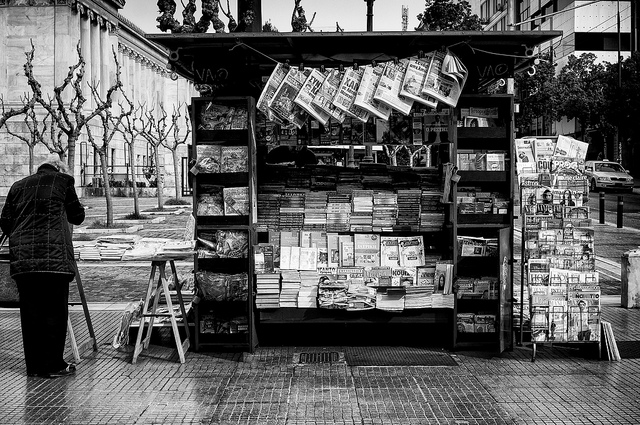Are journalists too busy going to war against each other, when they should be battling censorship and authoritarianism? This is the question posed by New York Times reporter David Carr, as he discusses the way different news organisations have responded to the recent spate of stories based on information handed over by whistle blowers.
Carr argues that the media see colleagues like Glenn Greenwald, the Guardian reporter broke the story of the National Security Agency’s activities, based on information he received from whistle-blower Edward Snowden as different. “The larger sense I get from the criticism directed at Mr. Assange and Mr. Greenwald is one of distaste — that they aren’t what we think of as real journalists. Instead, they represent an emerging Fifth Estate composed of leakers, activists and bloggers who threaten those of us in traditional media. They are, as one says, not like us” writes Carr.
Indeed Greenwald has become part of the story and his motives for reporting on the NSA have been questioned. David Gregory journalist and host of NBC’s “Meet The Press” asked Greenwald on his talk show, “To the extent that you have aided and abetted Snowden, why shouldn’t you be charged with a crime?”
Carr asks how the media justify their attitude to Greenwald, Wikileaks founder, Julian Assange, documentary maker Laura Poitras who has also worked on the NSA story, and to or David Miranda, Greenwald’s partner who was detained at Heathrow airport when travelling to London from Berlin. He was carrying documents for Greenwald, and several commentators, including Jeffrey Toobin, journalist for the CNN and The New Yorker, have called him a “drug mule.”. Carr argues that Assange, Greenwald, Poitras, Miranda have all acted in the public interest but are being vilified.
Why did the publication of the “Pentagon Papers,” which revealed details of U.S. decision making on the Vietnam war, by the New York Times turn reporter Daniel Ellsberg into a hero while the new generation of whistleblowers and newspapers such as The Guardian which publish the information they provide are looked on with distrust, disassociated with and singled out for criticism? Ellsberg reminded us recently in an interview, “at the beginning I wasn’t treated as a hero either. I was charged and spent two years in prison,” but added: “In those days journalists didn’t fight among themselves.”
According to Bill Keller from the New York Times, the relationship between sources, newspapers, and their competitors has always been riddled with danger but new technologies have caused a real rift in the business model and in journalistic practice.
Alan Rusbridger, editor-in-chief of the Guardian, agrees and goes a step further ““I think the people in our business who are suspicious of Glenn Greenwald and critical of David Miranda are not really thinking this through. The governments are conflating journalism with terrorism and using national security to engage in mass surveillance. The implications just in terms of how journalism is practiced are enormous.” answering people questions about the NSA revelations in a live blog Then commenting the behaviour of some of his colleagues in an article on the Guardian he wrote: “Those colleagues who denigrate Snowden or say reporters should trust the state to know best (many of them in the UK, oddly, on the right) may one day have a cruel awakening. One day it will be their reporting, their cause, under attack. But at least reporters now know to stay away from Heathrow transit lounges.”
Many journalists and media organizations agree with him. The New York Times and ProPublica decided to cooperate with the Guardian in the NSA file investigation and all these publications have received widespread support.
In one high profile instance, a group of Scandinavian newspapers wrote an open letter to the British government. Aftenposten (Norway), Dagens Nyheter (Sweden), Helsingin Sanomat (Finland) and Politiken (Denmark) accused David Cameron’s government of endangering the freedom of the press throughout the world in the way they have dealt with The Guardian, and with David Miranda.
In their letter the editors of the four daily newspapers said, among other things, that: “[…]the fact that the United States and the United Kingdom are among the most powerful countries in the world and ‘the main defenders of freedom and democracy in modern history’ makes their behaviour even more sinister: if China and Iran destroy the hard disks of newspapers and persecute journalists it is because they are dictatorships. If we do the same thing then we say we are defending democracy.”
The letter continued: “The British government’s actions resemble those that authoritarian regimes take, without encountering opposition, against the media, organizations and individuals that challenge their monopoly over power.”
This debate, over how the west deals with its media, is one that will continue to rage for some time yet.
This article was translated from the Italian Il Datagate e la definizione di giornalismo
Photo credit: Steve Rhodes / Flickr CC








































